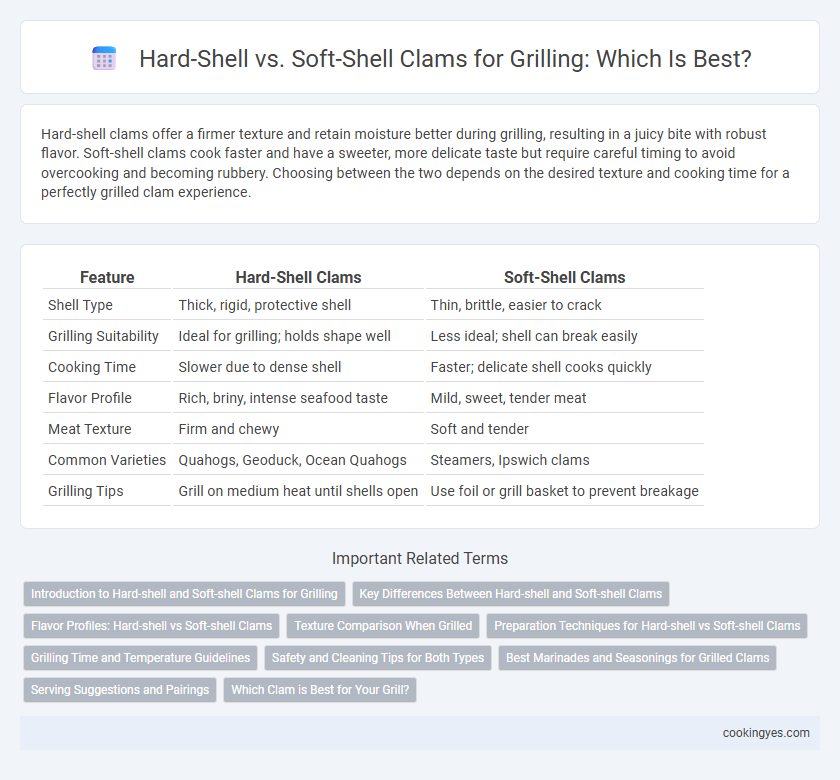Hard-shell clams offer a firmer texture and retain moisture better during grilling, resulting in a juicy bite with robust flavor. Soft-shell clams cook faster and have a sweeter, more delicate taste but require careful timing to avoid overcooking and becoming rubbery. Choosing between the two depends on the desired texture and cooking time for a perfectly grilled clam experience.
Table of Comparison
| Feature | Hard-Shell Clams | Soft-Shell Clams |
|---|---|---|
| Shell Type | Thick, rigid, protective shell | Thin, brittle, easier to crack |
| Grilling Suitability | Ideal for grilling; holds shape well | Less ideal; shell can break easily |
| Cooking Time | Slower due to dense shell | Faster; delicate shell cooks quickly |
| Flavor Profile | Rich, briny, intense seafood taste | Mild, sweet, tender meat |
| Meat Texture | Firm and chewy | Soft and tender |
| Common Varieties | Quahogs, Geoduck, Ocean Quahogs | Steamers, Ipswich clams |
| Grilling Tips | Grill on medium heat until shells open | Use foil or grill basket to prevent breakage |
Introduction to Hard-shell and Soft-shell Clams for Grilling
Hard-shell clams, known for their thick, durable shells, are ideal for grilling due to their ability to withstand high heat without breaking, preserving the tender, briny meat inside. Soft-shell clams, characterized by their thinner, more fragile shells, require careful grilling to avoid overcooking but offer a sweeter, more delicate flavor profile. Understanding these differences enhances grilling techniques, ensuring optimal texture and taste for each clam type.
Key Differences Between Hard-shell and Soft-shell Clams
Hard-shell clams have a thicker, more robust shell that provides protection and retains moisture during grilling, resulting in a firmer texture and richer flavor. Soft-shell clams feature a thinner, more fragile shell and a tender, sweeter meat that cooks quickly and absorbs marinades well. Key differences include shell thickness, cooking time, and flavor intensity, with hard-shells suited for longer grilling and soft-shells preferred for fast, delicate cooking.
Flavor Profiles: Hard-shell vs Soft-shell Clams
Hard-shell clams offer a briny, robust flavor with a chewy texture ideal for grilling, enhancing their natural saltiness and oceanic taste. Soft-shell clams provide a sweeter, more delicate flavor and tender texture that absorbs marinades well, resulting in a succulent and nuanced grilled dish. Choosing between hard-shell and soft-shell clams depends on whether a bold, intense flavor or a mild, buttery experience is preferred for grilling.
Texture Comparison When Grilled
Hard-shell clams develop a firm, slightly chewy texture when grilled, providing a satisfying bite that holds up well over high heat. Soft-shell clams, in contrast, offer a tender, juicy texture that cooks quickly, yielding a delicate mouthfeel with a mild chew. Grilling enhances the natural briny flavors of both types, but the distinct textural differences cater to varied preferences for seafood dishes.
Preparation Techniques for Hard-shell vs Soft-shell Clams
Hard-shell clams require thorough scrubbing and soaking in salted water to expel sand before grilling, ensuring a clean, sandy-free bite. Soft-shell clams, with their thinner shells and more delicate texture, benefit from gentle rinsing and can be grilled quickly to avoid overcooking and maintain tenderness. Proper preparation tailored to the clam type enhances flavor retention and grilling efficiency.
Grilling Time and Temperature Guidelines
For grilling hard-shell clams, maintain a medium-high heat of 400-450degF and grill for 5-7 minutes until the shells open, ensuring even cooking and safety. Soft-shell clams require a slightly lower temperature around 375-400degF and a shorter grilling time of 3-5 minutes, as their delicate shells cook faster. Monitoring internal temperature, ideally reaching 145degF, guarantees optimal texture and flavor for both clam types.
Safety and Cleaning Tips for Both Types
Hard-shell clams require thorough cleaning to remove sand and grit, ensuring safer consumption and minimizing bacterial contamination during grilling. Soft-shell clams, being more delicate, should be gently scrubbed and soaked in cold water to purge sand, maintaining food safety without damaging the shell. Proper handling includes preheating the grill to kill surface bacteria, and using a brush to clean shells and cooking utensils between uses to prevent cross-contamination.
Best Marinades and Seasonings for Grilled Clams
Hard-shell clams develop a robust flavor when marinated with garlic, lemon juice, and fresh herbs like parsley or thyme, enhancing their natural briny taste without overpowering it. Soft-shell clams benefit from bolder seasonings such as smoked paprika, chili flakes, and a splash of soy sauce or Worcestershire sauce, which complement their tender texture and sweet, delicate meat. Using a mix of olive oil and butter as a base in both marinades helps retain moisture and adds richness to the grilled clams.
Serving Suggestions and Pairings
Hard-shell clams, rich in briny flavor and firm texture, pair exceptionally well with garlic butter and a squeeze of fresh lemon when grilled, enhancing their natural sweetness. Soft-shell clams, known for their tender and slightly chewy bite, complement smoky barbecue sauces or tangy cocktail dips, making them ideal for casual, flavorful gatherings. Both types serve beautifully alongside crisp white wines like Sauvignon Blanc or light, citrusy beers to balance their oceanic nuances.
Which Clam is Best for Your Grill?
Hard-shell clams, such as quahogs and littlenecks, are ideal for grilling due to their robust shells that protect the meat from direct heat, ensuring a juicy and flavorful result. Soft-shell clams, or steamers, have thinner shells and a more delicate texture, making them better suited for steaming rather than direct grilling to avoid overcooking. For a grilling experience that balances ease and taste, hard-shell clams offer the best durability and smoky flavor enhancement.
Hard-shell vs Soft-shell for grilling Infographic

 cookingyes.com
cookingyes.com